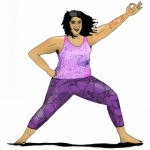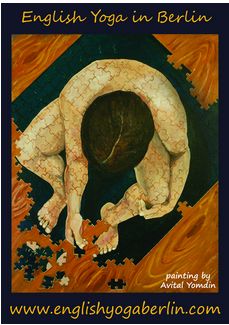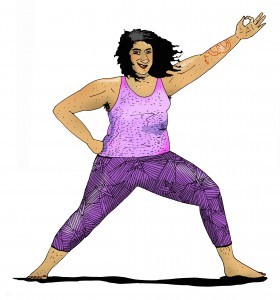What is NOT accessible yoga?

Do we all have to look the same?
You know the story. You’ve hurt your back and a friend says “you should do yoga!” And then you go with your friend to their favourite weekly yoga flow class. You put down 20€ and hope for the best. It’s fast, sweaty, the music’s hip, everyone’s dressed in the latest yoga fashion trend and almost everyone looks like a ‘yoga journal’ or ‘sein’ cover model. You find yourself struggling to keep up. You try your best, but somehow your body just won’t let you contort itself into those poses. The next day, your back hurts more than it did before, along with your wrists. And you swear you’re never trying yoga again.
Okay, it’s perhaps an exaggerated stereotype of what an accessible yoga class is NOT. But it does represent a rather broad view of what contemporary westernized capitalized yoga is all about. One of the problems is that most western people (both lovers and haters of yoga) believe that yoga is only that which is written above. I am not the first to say #notallyoga. But like all #notall hashtags, it tries to absolve the writer of responsibility that we should all be taking. Yoga is a 5000 year old practice stemming from South Asia. By believing that yoga is only that one thing that has been exploited by sporty opportunistic Californians erases its history and invisibilizes the decolonial work done by contemporary yogis such as nisha ahuja and Be Scofield. As yoga practitioners in a western world, we should all be working towards decolonizing our practice, promoting the diversity of yoga styles (eg; restorative) and practices (yoga nidra, pranayama, bhakti, etc.), and making yoga more accessible to everyone. Cultural appropriation does not make yoga classes at all comfortable or accessible to people who experience racism. Nor do expensive fees to lower-income folks, body-image and ‘healthy-living’ marketing campaigns to people who look different than what the mainstream expects healthy yogis to look like, nor to those with dis/abilities (physical or mental). Yes, I say “we,” but it means “I” and perhaps you too. What can I do as a non-South Asian yoga practitioner who teaches classes?
What IS accessible yoga?
I don’t have all the answers to this. But I have some ideas and would be happy to hear from you about what you feel that means. At English Yoga Berlin, we strive to offer accessible yoga classes. But we recognize that there are many things we cannot offer as well, and our studio is not accessible to just ‘everyone.’ Our Kreuzberg yoga studio is up one flight of stairs – this does not allow those who cannot take the stairs to even attend our classes. We also do not provide sign-language interpretation or any other language that we ourselves do not know (Greek, Spanish, German and English). We run our small back house yoga studio in a city with people from all over the world, with many different languages, and with a lower-income average than most bigger European cities. Our regular rates are significantly lower than bigger studios in Berlin, and we offer our classes in simple English, making it more economically and linguistically-accessible to newcomers. Pinelopi‘s injury conscious and gentle Hatha Yoga classes are especially suitable for participants who suffer from chronic pain. Juli‘s community yoga classes have at their focus the creation of an intentional space for people who feel marginalized or excluded in mainstream yoga classes, eg. queer and trans* folks, abundant bodied, bpoc. As well as an additional sliding-scale reduction for lower- / no-income folks who make Berlin their home (this reduction is not for tourists). Both of us include a 15-20 minute guided relaxation, based on yoga nidra techniques, at the end of all of our classes. Yoga Nidra is a proven method to help reduce stress, insomnia and anxiety. These are just some of the ways that I try to counter the dominant culture’s exploitation of yoga. But it’s a continual learning process and there are many more strategies that I continue to learn about and adopt through reading articles and discussing with others. There are other yoga practitioners who I’ve met in my Berlin community and in other places, who are also exploring various strategies. This movement is growing. I’d be happy to hear your thoughts on it, and appreciate links to articles and other yoga spaces! Thank you.


 Yoga Retreat “Beyond the Thinking Mind”
Yoga Retreat “Beyond the Thinking Mind” Deutschsprachige FLTI* Yoga
Deutschsprachige FLTI* Yoga Alexander Technique Teacher Training
Alexander Technique Teacher Training






